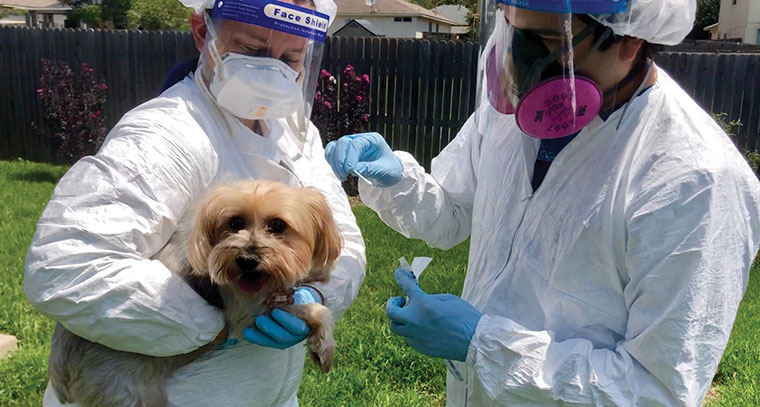
May 15, 2021
SARS-CoV-2 variant found in pets
Research groups found pets in the U.S. and U.K. have been infected with a SARS-CoV-2 variant of concern in human medicine.
A U.S.-based group, from Texas A&M University, announced in March that one dog and one cat from a home in Brazos County, Texas, had confirmed infections with a SARS-CoV-2 variant known as B.1.1.7. The Centers for Disease Control and Prevention lists B.1.1.7 among its variants of concern because, in humans, it’s known to be more transmissible and more likely to cause severe disease. It should be noted that dogs and cats are not easily infected with SARS-CoV-2 under natural conditions, and there is no evidence that infected cats or dogs spread the virus to other animals or to people.
The two animals in Brazos County developed sneezing before testing and appeared to recover to full health.

A separate research group reported March 18 in a pre-print article, available from bioRxiv, that at least two cats and one dog brought to a veterinary referral center near London had been infected with the B.1.1.7 variant between December 2020 and February 2021. The authors of that article also suggest the infections may be linked to myocarditis in the cats and dog, and they urged further study on transmission of the variant and its effects on pets.
From December through February, veterinarians at Ralph Veterinary Referral Centre near London saw an unexpected rise in the number of cats and dogs that had developed myocarditis without any history of heart disease, and the patients positive for B.1.1.7 were three of the 11 cats and dogs tested for SARS-CoV-2.
Dr. Sarah Hamer, a veterinarian and epidemiologist at the Texas A&M College of Veterinary Medicine & Biomedical Sciences, is principal investigator of a study on SARS-CoV-2 in pets, and her team found the B.1.1.7 infections in Brazos County, where the university is located.
The study involves collecting samples from pets living in homes with people confirmed to have COVID-19. By early April, the research group had identified SARS-CoV-2 infections in about 60 of the 450 pets tested, whether by use of a molecular polymerase chain reaction assay, an antibody assay, or both. Fewer than one-quarter of those infected animals developed clinical signs, such as coughing or diarrhea, and all the animals survived infection.
Dr. Hamer said that, while SARS-CoV-2 variants of concern have been associated with more severe clinical outcomes in humans, her group did not see more serious signs in the two confirmed cases of B.1.1.7 infection in pets identified in Texas. The team plans to continue collecting samples from the dog and cat with B.1.1.7, provided the owner is willing.
“We know from our studies, from other studies, that where there are human cases, it’s not hard to find animal cases,” Dr. Hamer said. “And it makes sense that maybe the lineages or strains that are in our animals are spillover from humans. But the key question moving forward, as the variants become more common, is: Will they have more adverse consequences for veterinary health?”
She said more research can show whether pets can maintain those variants, circulate them in homes, or become reservoirs for the virus.
Dr. Hamer said the pre-print article’s authors describe an interesting potential association between the infection and illnesses, and she sees a need for further testing.
“We don’t know if that’s a causal relationship,” Dr. Hamer said.
Dr. Casey Barton Behravesh, director of the CDC’s One Health Office in the National Center for Emerging and Zoonotic Infectious Diseases, said it’s unsurprising pets can become infected by the SARS-CoV-2 variants of concern, and additional studies are needed to understand what impact the variants may have on pets and other animals. She said that, among all animals infected with SARS-CoV-2, few developed severe disease.
Variants are expected to emerge, she said. Some will disappear, while others persist. Pets and other animals may be impacted by the variants, and the CDC and U.S. Department of Agriculture are collaborating with other partners on work examining genomic sequences, analyzing variants and their impact, and comparing those data with cases in animals.
“If a person is sick, they should avoid contact with people as well as animals during their illness,” Dr. Barton Behravesh said. “That’s really important to prevent the spread of the virus from people to animals.”
The CDC also recommends that people worried their pets could be infected with SARS-CoV-2 call their veterinary clinic ahead of a visit, rather than arriving unexpectedly.